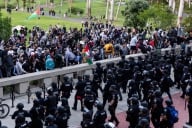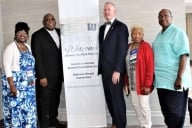You have /5 articles left.
Sign up for a free account or log in.
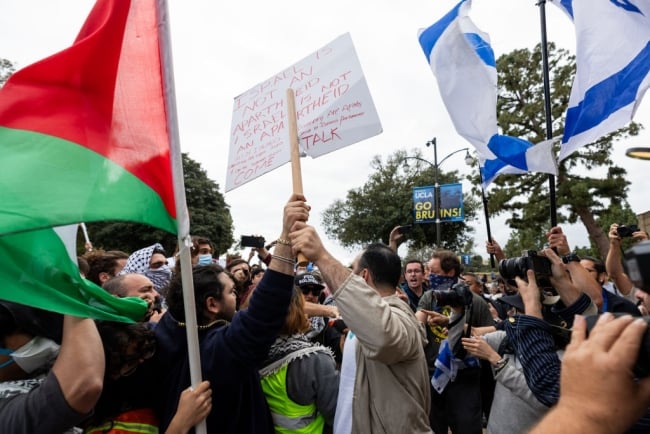
Students protesting at the University of California, Los Angeles in April.
VCG/Getty Images
Tense moments abounded at the most recent Congressional hearing focused on antisemitism on American college campuses. As policy makers lambasted the university presidents present about their handling of campus protests over the Israel-Hamas war, the presidents sat quietly waiting to respond.
Congresswoman Lori Chavez-DeRemer, an Oregon Republican, accused the group of being “directly responsible” for the recent rise in antisemitism on college campuses, comparing the current climate to the lead-up to the Holocaust, and lectured them on Jewish history.
“To everyone who will see this, I ask that you visit the Holocaust museum here in D.C.,” she said during the House Education and Workforce Committee hearing last month. “I want you to kneel down and touch the stone which paved the grounds of Auschwitz. I want you to peer over the countless shoes of murdered Jews.”
Those deaths were “enabled by global culture, indifference and hatred, a culture which each of us has a role in either enabling or ending” she said addressing each of the presidents by name. “I would remind you … of who you are, you are leaders of culture. At this present moment, you have abandoned that role. I hope you reclaim it because we’ll certainly be watching.”
That two of the three presidents on the hot seat were Jewish seemed lost on the congresswoman, who is not Jewish. Gene Block, chancellor of the University of California, Los Angeles, had spoken in his opening remarks about his own experiences with antisemitism, and Michael Schill, president of Northwestern University, has described himself as a descendant of Holocaust survivors who has relatives who fled to Israel. (The president of the Massachusetts Institute of Technology, Sally Kornbluth, is also Jewish and was also brought before Congress for the first hearing on this issue in December.)
The campus protests and the resulting Congressional hearings have put all college and university presidents on notice, but Jewish presidents find themselves in a uniquely challenging position where many feel they can’t win.
They’ve been forced to navigate issues that are deeply personal to some of them and rooted in their own identities and upbringing, while being thrust into the spotlight of national discussions about campus antisemitism and violence in Gaza. They’ve been accused by policymakers, faculty members, donors, students and students’ parents of either fostering antisemitism—a form of discrimination with which some presidents feel intimately familiar—or failing to protect academic freedom and free speech, or both.
They also have their own myriad opinions on the conflict, how neutral or open to be with their views, and how their identities could affect how their decisions are perceived.
Below are some of these presidents' thoughts on navigating this particularly difficult personal and professional moment.
Michael Roth, president of Wesleyan University
Roth, who has led the private Connecticut institution for 17 years, said some of his first memories of feeling Jewish weren’t the religious or cultural rituals he’s come to value later in life but instances of antisemitism he encountered early in life that stuck with him, such as when an elementary school classmate called him a “kike head” and “stupid Jew.”
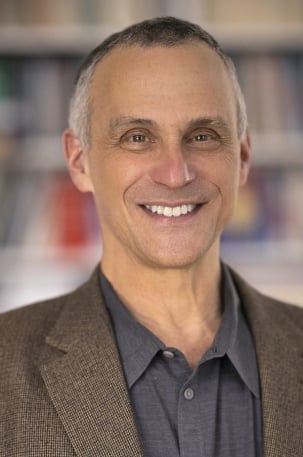
Michael Roth
Roth is disturbed but not surprised antisemitism still exists. He also doesn’t believe pro-Palestinian protests are inherently antisemitic. He has openly called the violence in Gaza a “humanitarian catastrophe” and called for a ceasefire in March. Wesleyan leaders also met with protesters who set up an encampment on campus and had transparent discussions with them about the university’s investments, though Roth is openly against a boycott of Israeli companies. The university's leaders and the protesters reached a successful agreement to close down the encampment in May.
Roth suspects some onlookers might make assumptions about his opinions on the conflict because he’s Jewish. He’s also taken some heat for his decisions from people on and off campus, including from his own Jewish community, which can be agonizing.
“To be called an antisemite by other Jews, I mean, it’s ludicrous, but it’s hard for me to just laugh it off,” he said.
He’s also met with Jewish students and said the “connectivity” of a shared identity creates a certain comradery and trust, but at the same time, “they were really angry with me.”
“I thought they had to build resilience against words they don’t like or chants they don’t like,” he said. “And I was not going to try to censor those chants, even if I don’t like them.”
Ronald D. Liebowitz, president of Brandeis University
Brandeis, located in Waltham, Mass., was founded by American Jews in 1948 at a time when some universities sought to limit Jewish enrollment. That Jewish history gives the campus a different historical identity and culture than most campuses, said Liebowitz, who was formerly president of Middlebury College, in Vermont. About a third of Brandeis’s roughly 3,500 undergraduates are Jewish, as are at least 60 percent of alumni.
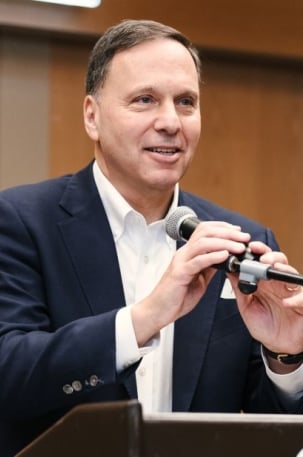
Liebowitz believes Brandeis’s Jewish legacy prompted him to be somewhat “bolder” in his approach to the current conflict than he might have been at Middlebury.
He made the decision to revoke the charter of the Brandeis chapter of Students for Justice in Palestine in November because he was concerned about the national organization’s rhetoric on social media, which he described as “harassing and threatening.” He received pushback from some faculty members and students for that decision, but he believes that Brandeis, as a private university, sometimes has to limit free speech to create a better learning environment. He said students are welcome to start other pro-Palestinian groups.
He added that he’s heard from Palestinian and Muslim students that “they feel invisible,” as they see surges of activism and support for Palestinians on other campuses but less so on their campus. He said it’s “imperative” that these students also feel “part of the institution.”
“That’s something we must work on,” he said.
He has his own ties to Judaism and Israel. His grandparents fled pogroms in what was then Russia, and he was raised in a Conservative Jewish home. His grandfather gifted him a trip to Israel after his senior year of college, and he and his wife and children have been back many times since. But he said he tries to maintain a sharp divide between his personal connection to these issues and his role as president.
He noted that, even if he didn’t have Jewish roots or a personal tie to Israel, to be an effective president, he needs to be “very cognizant and sensitive to the alumni body,” as he would at any university, “and to where Brandeis sits within American higher education.”
R. Barbara Gitenstein, president emerita of the College of New Jersey
Gitenstein was the first Jewish president of the college and led it for 19 years until 2018. She said dealing with any campus issue that has some kind of personal resonance is a challenge for presidents.
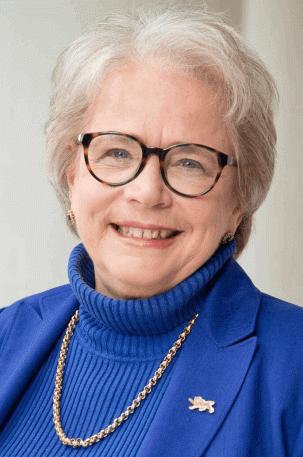
She suspects that the internal turmoil some Jewish college presidents are experiencing is not dissimilar to that of some Black presidents in the aftermath of the killing of George Floyd or how LGBTQ+ campus leaders might feel when homophobic incidents happen on their campuses. She added that Muslim college presidents are also likely struggling with how to navigate the current moment.
“These are not challenges that are a surprise to other presidents who have different identities,” she said.
She said her Jewish values, including an emphasis on social justice, influenced how she went about her leadership role. At the same time, she believes presidents have to make decisions based on what they think is best for “the full institution,” regardless of their personal identities. To her, that means robust communication with students to explain sometimes fraught decisions, and not resorting to calling police on protesters unless there’s a very clear threat of violence. She found it hard to watch Congress criticize presidents for having dialogue with their campus protesters, and in some cases, reaching agreements to address some of their concerns.
“I don’t think that’s a flaw,” she said. “That’s a quality of strength.”
She sees Jewish presidents as having a role to play in modeling “resilience” to Jewish students as they hear all kinds of comments about the Israeli-Palestinian conflict from classmates, including some who may say hurtful things without intending to or who may not know when their rhetoric has veered into antisemitism.
“I’m sure there are [Jewish] students who are feeling uncomfortable and frightened,” she said. Jewish presidents can help them by telling them, “‘Look, I felt that way before. Here are some experiences that I went through, and I survived.’”
“I’m not saying just to accept it,” she said. But “just because someone says something awful doesn’t mean you have to internalize it.”
Gene Block, chancellor of the University of California, Los Angeles
Block, who is retiring this year, stressed in his opening remarks before Congress in May that the issue of campus antisemitism struck close to home.
“Trust me, I understand their pain,” Block said of UCLA Jewish students disturbed by certain rhetoric and images related to the war voiced and displayed on campus. “I’ve lived it myself.”
He spoke of growing up in a Jewish family that included Holocaust victims and survivors. He mentioned watching neo-Nazis march through Charlottesville, Virginia, including “outside the synagogue where my children were called to the Torah” when he was the provost of the University of Virginia. He also described seeing art of himself “with exaggerated facial features that was reminiscent of caricatures of Jews during the Nazi era” at UCLA.
However, he emphasized that UCLA has a history of peaceful protest and that “being an American means sometimes being asked to tolerate offensive and even hateful speech protected by our Constitution.”
He noted that he left the university’s encampment alone until violence broke out between protesters and counterprotesters, at which point he called the police.
He said students shouldn’t be threatened or discriminated against based on their identities or beliefs, but simultaneously, academic freedom and free speech need protecting.
“It is not always easy to strike a perfect balance, but it must always be our goal,” he said.
Michael Schill, president of Northwestern University
Schill, president of the private institution in Illinois since 2022, has been open about his Jewish identity and about how difficult it has been to be accused of aiding the spread of antisemitism. He experienced backlash from Jewish groups and students and was requested to take part in the Congressional hearing last month, after reaching an agreement with pro-Palestinian student protesters to remove their encampment in exchange for certain concessions.
“I am a proud Jew who practices many of our rituals,” he wrote in an op-ed in the Chicago Tribune in May, before his hearing. “Being Jewish is core to my identity, and I grew up with a love for Israel, which remains today. My family has experienced antisemitism, and so claims by some that I have collaborated with antisemitic people feel like personal affronts.”
He wrote that among the Jewish values he admires is a “culture of rationality and tolerance” which he believes dovetails well with “the core value of universities to engage in dialogue and seek to bridge differences peacefully.” He saw the deal he struck with student protesters as a manifestation of those values. Protesters took down their tents, and in exchange, the university promised to be more transparent about its investments, support two Palestinian visiting faculty members and five Palestinian students to come to Northwestern as a part of its “Scholars at Risk” program and create a house for Middle Eastern, North African and Muslim students.
He said removing the encampment, which was viewed as “a source of antisemitic intimidation” by many Jewish students, allowed peaceful demonstrations to continue.
“We stand ready to commence disciplinary proceedings against anyone who breaks our rules or engages in antisemitic or anti-Muslim behavior,” he noted.
The agreement “was possible because we sought to follow a set of principles, many of which I would argue are core to the tenets of Judaism,” Schill wrote.








